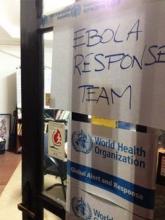Addressing ethical challenges regarding quarantine, payment of health care workers, and the proper use of personal protective equipment could contribute significantly to the containment of the Ebola outbreak in West Africa, according to experts from Johns Hopkins University, Baltimore.
Citing reports of health care workers fleeing clinics, Nancy Kass, Sc.D., said that the international community is in good position to make sure that doctors, nurses, and other staff members at Ebola treatment centers are properly and regularly paid, noting that many are not.
Even before Ebola, "there were so many things going on in these environments that were unethical" in terms of pay and staffing practices, Dr. Kass, deputy director for bioethics and public health at the JHU Berman Institute of Bioethics, said at a forum held by the university.
The international community needs to provide personal protective equipment and training to all involved, she said, "including the person who cleans the floor."
Survivors of Ebola infection could be safely recruited to perform community outreach "and get a ton of money for doing it," Dr. Kass said.
Raising pay as well as service and staffing standards at clinics could also improve compliance with quarantine demands, she said, while also making quarantine fairer to patients and families.
"In a vacuum, we can think of the most ethical ways to manage quarantine," such as allowing family members to hold the patient’s hand through a barrier, Dr. Kass said. But when resources are tight, quarantine can mean a patient is isolated to the point of being deprived of food and water.
Tim Roberton, a fourth-year doctoral student at the university’s Bloomberg School of Public Health returned from Guinea in July. He said that he found that achieving compliance with quarantine could be a delicate matter, particularly in remote villages.
"To tell someone that you have to get to a treatment center when you get sick, that’s serious business. Do we expect people to comply knowing they’ll never see their families again?"
Even pushing for essential changes in burial practices to avoid infection "is really complicated," he said, and requires cooperation from local officials and religious leaders.
Mr. Roberton’s trip was part of a collaboration between the university and the International Foundation for the Red Cross, which has hundreds of volunteers working in Ebola-affected communities to communicate information about the outbreak, manage dead bodies, and disinfect sites.
"What will stop this is working with communities at the village level to help themselves not spread the disease," Mr. Roberton said, noting that resources should not be directed to research at the expense of controlling the outbreak.
Others at the forum, including panelist Dr. Trish Perl, a clinical epidemiologist with the Johns Hopkins Health System, disagreed with the idea that research and outbreak control goals needed to be in conflict.
"Whatever is done, it is incumbent upon all of us to make sure transparency and scientific rigor is inserted into the process," Dr. Perl said. With SARS (Severe Acute Respiratory Syndrome), "many people got steroids – this ended up hurting people, and there was not so much accountability with how that happened. We have to not do harm."
A number of attendees at the forum pressed the presenters on whether current containment strategies needed to be harder-edged or more coercive to be effective. "There is perhaps a time when coercion is necessary, Mr. Roberton acknowledged.
Dr. Perl alluded to a proposed role for the U.S. military in the Ebola crisis, though she stressed that she did not know what specific approach would be employed.
"I am far from the kind of person who would normally advocate" such a response, she said, but with the outbreak maturing and so many affected, "a command and control structure may be what is needed."
With smallpox, Dr. Perl added, "some pretty draconian things were required."

